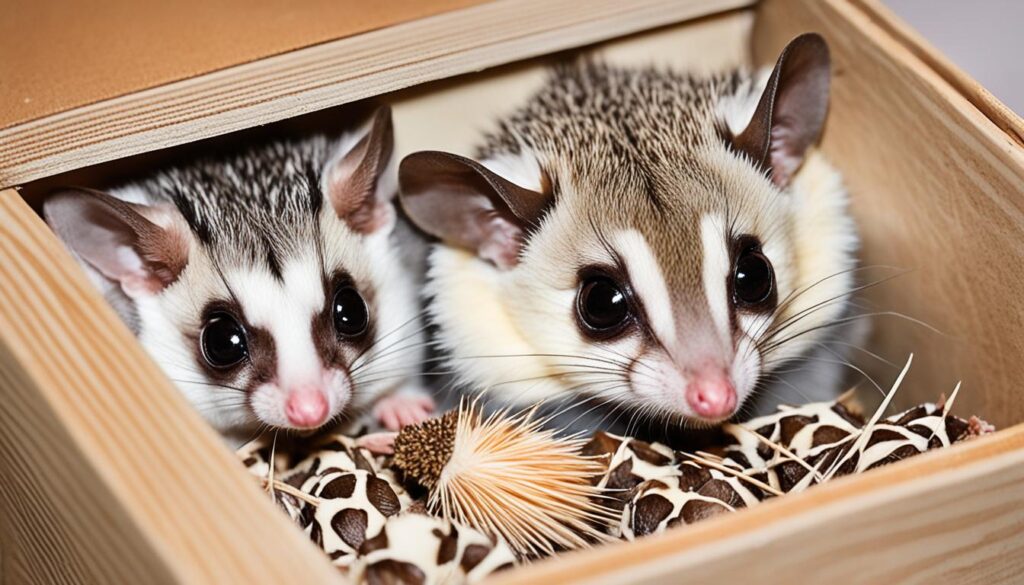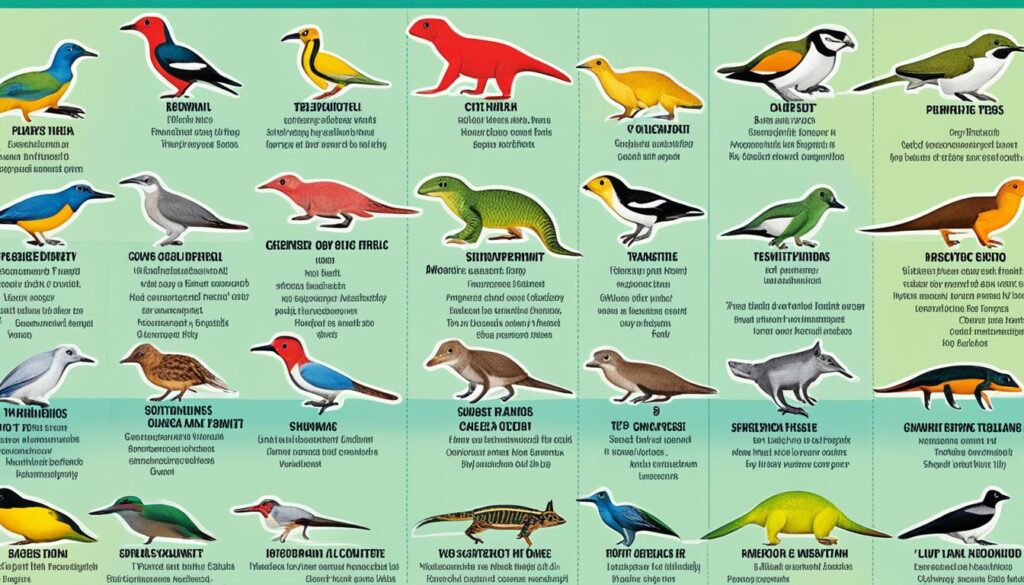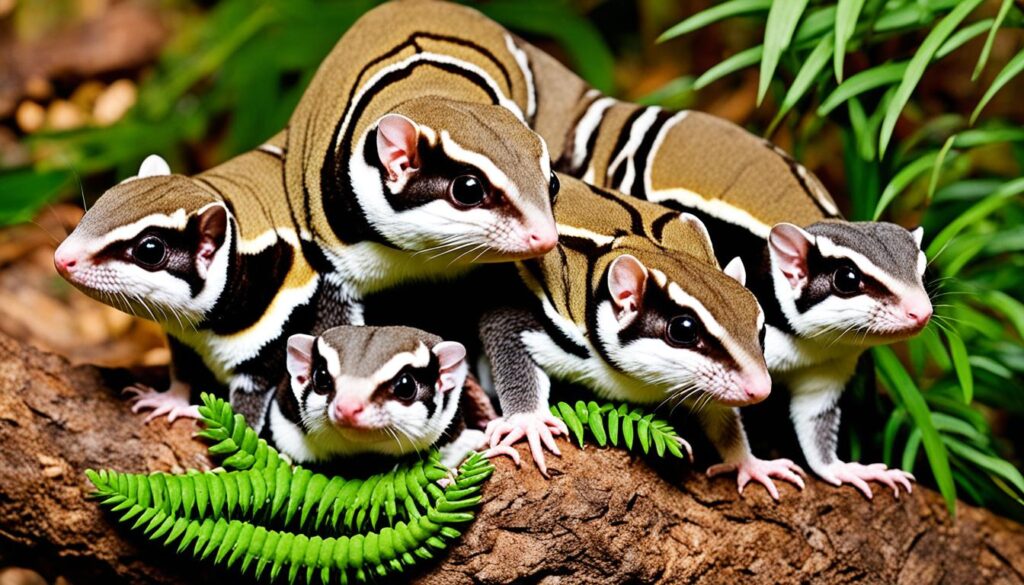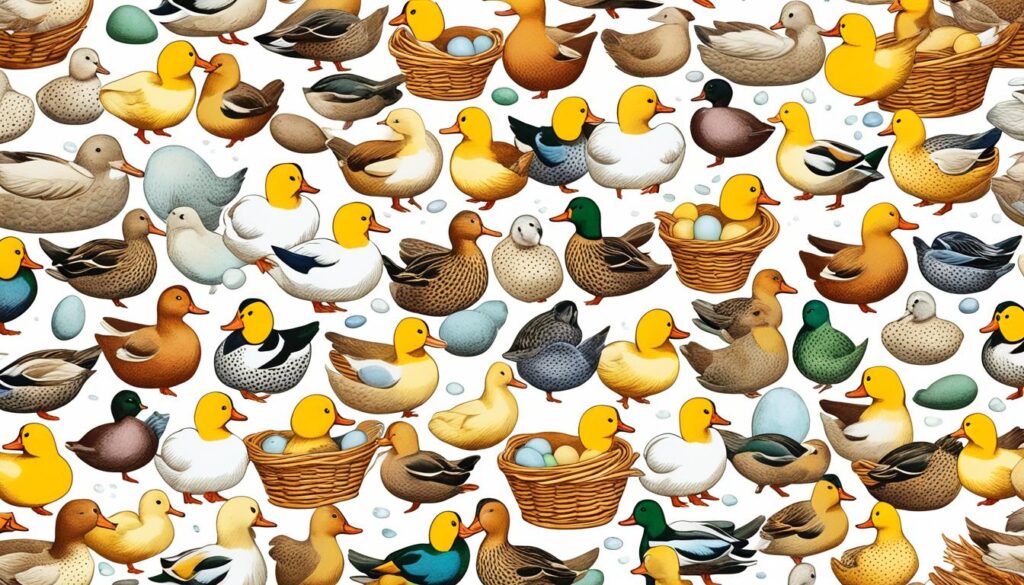Did you know over 24 million animals are pets in Australian homes? Australia is famous for its unique wildlife. It also has a big exotic pet market. Many species are legal pets, but owning them comes with rules to keep everyone safe.
This guide will cover legal exotic pets in Australia, the laws, and what you need to know before owning one. It’s for both new and experienced pet lovers. You’ll get the info to make smart choices about your exotic pet in Australia.
Key Takeaways
- Australia has a wide range of legal exotic pets, including reptiles, amphibians, birds, and certain mammals.
- Strict laws and regulations govern the ownership and import of exotic pets in Australia, with specific requirements for permits and licenses.
- Responsible exotic pet ownership in Australia requires careful research, preparation, and adherence to housing, care, and safety guidelines.
- The costs of exotic pet ownership in Australia can be higher than traditional pets, with specific setup and ongoing care expenses to consider.
- Understanding the unique challenges and regulations surrounding exotic pets in Australia is crucial for ensuring the well-being of both the animal and the owner.
Introduction to Exotic Pet Ownership in Australia
Exotic pets are animals that people keep as friends, unlike common pets like cats and dogs. In Australia, owning these pets has its own set of laws and rules. These laws change from one state to another. This section will cover the legal rules for exotic pet owners, including what you need to know before getting one.
Definition of Exotic Pets
Exotic pets are animals not usually thought of as pets. They include reptiles like snakes and lizards, amphibians such as frogs, birds like parrots, and small mammals like sugar gliders. Many people in Australia are interested in these unique pets.
Overview of Australian Laws and Regulations
The laws about exotic pet ownership in Australia are detailed and differ across states. Some exotic pets are okay to own, but others are not allowed or need special permits. It’s important for potential owners to know the rules in their area.
In Queensland, owning certain exotic animals like mammals, reptiles, and amphibians is banned. On the other hand, New South Wales and Victoria allow a broader range of exotic pets, but only if you have the right license and take good care of them.
All exotic pet owners in Australia must be ready to give their pets special care, the right living conditions, and the correct food. Not doing so can lead to legal trouble and harm the pet’s health and well-being.
The legal rules for exotic pets in Australia are complex and always changing. Anyone thinking of getting one needs to do a lot of research and understand the laws well before deciding.
Legal Exotic Pets in Australia
Australia is a great place for those interested in legal exotic pets. You can find reptiles and amphibians that are okay to keep as pets. But, some are not allowed at all.
Reptiles: Snakes, Lizards, and Turtles
In Australia, you can own reptiles like snakes, lizards, and turtles. But, you need to follow the rules and get the right permits. Each state has its own laws, so make sure to check what’s allowed in your area.
Amphibians: Frogs and Newts
Frogs and newts are also permitted exotic pets here. But, the rules for owning them vary a lot. Some states let you keep certain frogs, while others have more rules or even ban them.
| Reptile Pets | Amphibian Pets |
|---|---|
|
|
Owning exotic animals in Australia comes with strict rules. Not all animals are allowed as pets. It’s up to the owner to know and follow the laws. This keeps everyone safe, including the animals and the community.
“Exotic pets in Australia require careful consideration and compliance with regulations to ensure the animals’ welfare and public safety.”
Birds as Exotic Pets
Australia is home to a variety of unique and fascinating birds that can be kept as pets. Parrots and cockatoos are popular for their bright colors, playful nature, and smartness. But, owning these birds in Australia means knowing a lot and following the laws to keep the bird and its owner happy.
Parrots and Cockatoos
Many people in Australia want parrots and cockatoos as pets. You can have budgies, cockatiels, cockatoos, lorikeets, and other parrots. Each bird needs different care, like food, a place to live, grooming, and friends. It’s important to do your homework before getting an exotic bird to make sure you can give it a good home.
- Budgies: Small, vibrant parrots known for their cheerful personalities and ability to learn tricks.
- Cockatiels: Medium-sized cockatoos with a distinctive crest and friendly, gentle nature.
- Cockatoos: Larger parrots with distinctive crests and a tendency to be affectionate but also loud and demanding.
- Lorikeets: Brightly colored parrots with specialized diets requiring frequent feeding.
- Parrots: A diverse group including Amazon, Eclectus, and Macaw species, known for their intelligence and impressive vocalizations.
If you want an exotic bird in Australia, you must learn about their needs and the laws. You’ll need to get permits and licenses too. With the right effort and dedication, these colorful and lively birds can be great pets for your family.
Mammalian Exotic Pets
In Australia, owning certain mammalian exotic pets is allowed. This includes sugar gliders and hedgehogs, which are quite popular. We’ll look into the rules, care, and things to think about before getting one.
Sugar Gliders
Sugar gliders are small, nocturnal marsupials from Australia. They’re known for gliding through the air, making them interesting pets. But, owning exotic animals in australia comes with big responsibilities. They need special homes, food, and friends to be happy and healthy.
Hedgehogs
Hedgehogs are another legal exotic pet in some parts of Australia. They’re small, spiky, and quite charming. But, owning a hedgehog means you must provide the right care and home for them.
Before getting any exotic mammal, it’s key to know the rules and what they need. Making sure you can give them a good home is crucial for their health and safety, and for keeping the community safe too.

what exotic pets can you own in australia
Australia is a great place for those who love exotic pets. Some pets are banned, but others can be kept with the right permits. Let’s look at the exotic pets you can own in Australia.
Reptiles and Amphibians
Reptiles like snakes, lizards, and turtles are popular pets here. But, you need government permission and special care for them. In places like New South Wales, you can own reptiles with the right license.
Exotic Birds
Birds, especially parrots and cockatoos, are also popular pets. They are smart and social, but they need special care. You should think about their needs and how they might affect your life.
Small Mammals
You can own small exotic mammals like sugar gliders and hedgehogs in some areas. But, you must learn about their care and the risks they could bring to local wildlife before getting one.
Remember, owning exotic pets in Australia has rules that differ by state and territory. You must research and follow these laws to protect the animal and your community.
“An ongoing illegal international trade in exotic wildlife threatens animal welfare and conservation efforts, with many animals suffering during smuggling attempts.”
In summary, Australia lets you own a variety of exotic pets, from reptiles to birds and small mammals. But, being a responsible owner and following the laws is key. This ensures the pet’s well-being and keeps the community safe.
Regulations and Permits for Exotic Pet Ownership
Owning an exotic pet in Australia comes with many laws and rules. These rules change from state to state. It’s important to know what you need before getting an unusual pet.
State and Territory Laws
Exotic pet laws in Australia vary by state and territory. Each place has its own rules for owning these pets. For example:
- In Alaska, no one can have, sell, bring in, or take out any bird, mammal, or reptile. This includes wild animals and some domestic ones too.
- Georgia needs special permits for wild animals like kangaroos, primates, crocodiles, alligators, bats, sloths, and venomous snakes.
- California doesn’t allow most wild animals as pets. This includes seals, bighorn sheep, otters, elephants, and falcons.
Licensing Requirements
Getting the right licenses and permits is also key for exotic pets in Australia. The rules depend on the animal and where you live. Here are some important points:
- Many places have different permits for “dangerous” or “prohibited” animals. These need more paperwork.
- Permits must be renewed every year. Owners might also face inspections to check on the animal’s living conditions and health.
- Owners must show they have the right enclosures, vet care, and money for their pets.
Understanding the rules for exotic pets in Australia is vital for the pet’s and owner’s safety. It’s important to look into the laws and permits needed in your area before getting an exotic pet.

Exotic Pet Housing and Care
Looking after exotic pets right is key to their health and the owner’s safety. These animals need special homes that meet their needs. Things like temperature, humidity, and space are important for their happiness and health. Knowing what each pet needs is crucial for caring for them in Australia.
Enclosure and Habitat Requirements
The home for an exotic pet should feel like its natural habitat. It needs the right temperature, humidity, and light. For instance, reptiles like snakes and lizards need warm spots and cool spots in their home. Amphibians like high humidity to stay healthy.
It’s also important to keep exotic pets busy and happy. This means giving them places to hide, things to climb on, and toys to play with. Without these things, they might get stressed, sick, or have bad behavior.
| Exotic Pet | Enclosure Requirements | Habitat Enrichment |
|---|---|---|
| Snakes | Appropriate temperature gradient, humidity control, hiding spots | Branches, rocks, and other climbing structures |
| Lizards | Basking and cooling areas, substrate for burrowing | Hides, climbing perches, and interactive toys |
| Frogs | High humidity, water features, proper substrate | Hiding spots, live plants, and water features |
People who want to own exotic pets in Australia should do their homework on what they need. Talking to experts like vets and breeders can also help make sure you’re giving your pet the best life.
Costs and Considerations for Exotic Pet Ownership
Owning an exotic pet in Australia means big financial responsibilities. You’ll need to pay for the pet itself, its setup, and ongoing care. This includes vet bills. Owners must be ready for a big investment to care for these animals right.
Initial Purchase and Setup Costs
Buying an exotic pet can cost a lot, from hundreds to thousands of dollars. Setting up a good home for them also adds to the cost. You’ll need special enclosures, lights, heaters, and equipment to control humidity.
Ongoing Care and Veterinary Expenses
Exotic pets need special food and health care, which costs a lot. Things like special diets and vet visits can add up fast. Some owners spend thousands a year on their pets. Finding vets who know about exotic animals can also be hard and expensive.
Thinking about getting an exotic pet in Australia is a big decision. You should look into what you’ll need and how much it will cost. Make sure you can give the pet the care it needs for its whole life.
“The complexity of owning exotic animals is highlighted, with zoos and experienced owners recommending against keeping them due to the challenges and risks associated with caring for wild animals versus domesticated ones.”
Before getting an exotic pet, know the laws, what licenses you need, and the risks. This helps you make a smart choice. It also makes sure you and your pet are happy and healthy.
Exotic Pet Safety and Zoonotic Diseases
Owning exotic animals in Australia can be exciting and rewarding. But, it’s important to think about the risks and safety issues. These pets can carry diseases that can spread to humans.
Recent data shows that 75% of new diseases found in the last decade are from animals to humans. 72% of these diseases come from wildlife. This shows why it’s key to know the health risks and take steps to stay safe with exotic pets in Australia.
Potential Zoonotic Diseases
- Salmonellosis: Up to 93.7% of reptiles carry Salmonella spp. in their gut. Touching reptiles or their waste can spread Salmonella to humans. Some reptiles carry tough Salmonella strains.
- Dermatophytosis: Guinea pigs and other small mammals can have Trichophyton mentagrophytes. This fungus causes skin infections in both animals and people.
- Psittacosis: Birds like parrots can have Chlamydia psittaci. This can cause psittacosis in people. It’s rare to pass it to another person but can lead to mild to serious illness.
While there are risks of zoonotic diseases, many can be treated. With care, the chance of getting these diseases is lower. Responsible exotic pet ownership means knowing the risks and how to stay safe.
By being informed, keeping clean, and getting vet advice, exotic pet owners in Australia can face challenges and enjoy these unique pets.
Responsible Exotic Pet Ownership
Owning an exotic pet in Australia means doing your homework, getting ready, and finding good breeders and sellers. It’s key to know the care needs, laws, and challenges of having an exotic pet before you start.
Research and Preparation
Learn about the needs of the exotic pet you want, like the right home, food, and vet care. Check the laws on exotic pets in your area since they differ. Make sure you can afford and manage the care for your new pet.
Reputable Breeders and Sellers
It’s vital to buy from breeders and sellers who care about the pets. Stay away from online ads or people who don’t share much about the pet’s background, health, and care. Look for pet stores, licensed breeders, or groups that are ethical and follow the law when selling exotic animals in australia.
To be a responsible exotic pet owner in Australia, understand the special challenges and duties. Do your homework, prepare well, and buy from trusted sources. This way, you’ll make sure your exotic pet is happy and healthy, following unusual pet regulations australia and permitted exotic pets australia rules.
“Exotic animals are often shown as babies with ‘cute’ pictures but little info from the seller. Ads often don’t share the seller’s exact location, just a general area or state. Most contact with the seller is through email.”
Conclusion
Owning exotic pets in Australia is exciting and rewarding. But, it’s important to know the legal framework, care needs, and risks. By doing your homework, following the regulations, and being a responsible owner, you can enjoy the unique world of what exotic pets can you own in australia. This ensures the pets and their owners are happy.
This guide has covered the legal exotic pets allowed in Australia, the exotic pet laws in australia, and what to consider before getting one. If you’re interested in reptiles, amphibians, birds, or mammals, knowing the legal exotic pets in australia and their care is key. It helps make owning an exotic pet a positive experience.
Staying updated on exotic pet laws in australia and focusing on your pet’s health is important. It lets you start a rewarding journey of what exotic pets can you own in australia. Being a responsible owner of exotic animals in australia shows your dedication. It also helps protect these amazing creatures.
FAQ
What is the definition of an exotic pet in Australia?
Exotic pets are animals that are not typical household pets like cats and dogs. They are kept as companions by people.
What are the key laws and regulations governing exotic pet ownership in Australia?
In Australia, owning exotic pets is governed by complex laws and regulations. These vary by state and territory. Owners must meet the specific requirements of their area.
What types of reptiles and amphibians are legal to own as exotic pets in Australia?
Some reptiles and amphibians are banned, but others like snakes, lizards, turtles, frogs, and newts are allowed. They must be kept under certain rules and with the right permits.
Can I own birds as exotic pets in Australia?
Yes, some birds like parrots and cockatoos can be kept as pets in Australia. Owners must follow special rules for their homes, care, and licenses.
Are there any mammalian exotic pets that are legal to own in Australia?
Yes, you can own certain mammalian exotic pets in Australia. This includes sugar gliders and hedgehogs, but there are rules and things to consider for each one.
What are the state and territory-level laws governing exotic pet ownership in Australia?
Laws for exotic pets vary by state and territory in Australia. People wanting to own these pets must look into the rules where they live and follow them.
What are the housing and care requirements for exotic pets in Australia?
It’s important to provide the right home and care for exotic pets. This means keeping the right temperature, humidity, and space for each type of pet.
What are the financial considerations for owning an exotic pet in Australia?
Owning an exotic pet in Australia costs a lot of money. This includes buying and setting up, plus ongoing care and vet bills. Owners need to be ready for these costs.
What are the potential risks and safety concerns associated with exotic pet ownership in Australia?
Exotic pets can be risky, including the chance of passing diseases to people. It’s important to handle them safely and keep them clean for the pet and the owner’s health.
How can I ensure responsible exotic pet ownership in Australia?
To own an exotic pet responsibly in Australia, do your homework, prepare well, and get from trusted breeders and sellers. Know the care needs, laws, and challenges before you start.



